#Devouring Ruin
Explore tagged Tumblr posts
Audio
Wake - Kana Tevoro (Kania! Kania!)
3 notes
·
View notes
Note
two long dragon tongues down your throat is better than one <3
So I was going to answer this like a normal ask just fangirling and screaming yes but then it kinda reminded me of this abandoned wip I had sitting in my docs and IT WAS TOO GOOD TO LET IT PASS.
So sorry this sat on my inbox so long csvajckwxbhaj I promise I am not ignoring :c <3 work is just killing me and also this got out of hand HAHA WHAT A SURPRISE
it was written before 4.2 dropped (maybe before 4.1 even I can't recall) so there are some little things here and there that are technically not canon anymore//hit

Neuvillette is absolutely fascinated.
The chief Justice of Fontaine has lived for many many years, seen, learned and experienced a lot of what the world has to offer, at least within the confines of his beloved hydro nation. Always a diligent man, carrying out his role and job at the court to perfection. Yet there was something he’d always… disregard.
Some more basic instincts pertaining to his true draconic nature.
He’d had enough in his plate as it was, practically managing the nation, keeping lady Furina both entertained and out of trouble, taking care of the Melusine, and a myriad of other duties in between. Truth be told, he was a tired old dragon not having much time or interest in the pursuit of a romantic companion.
So how did he end up here? Having a sample of the most sacred and valuable treasure of another dragon. Their mate.
Neuvillette is mesmerized at how your body reacts, jerking and trembling in unadulterated pleasure. Entranced a how your lips part with labored puffs and cute little sounds he didn’t know humans were capable of. High pitched whines, long drawn-out moans. Hypnotized by your eyes, usually so alert, so smart and playful… now glazed over, clouded with euphoria yet so raw and sincere in their emotions, begging him not to stop.
And your scent… oh, the most decadent sinful scent he’d ever sensed. His pupils dilating and turning back to slits as his stare focused on your drooling pussy. His mouth dry, his fangs aching. He wanted to drown all of his senses in you.
Darkened fingers slide across your folds, a little colder than normal for a human which is why he’d always wore gloves, but you mewl appreciatively and gladly accept them. Clenching warm and wet around the digits.
And his breath catches.
“Hmmm… you’re doing so well, baobei.”
The Iudex’s eyes flicker momentarily at the other man, or should he say, other dragon. The former Geo Archon Morax, quite literally a mythical figure exuding an aura of power far greater than his current own. He is older, wiser, stronger, a deity once involved in the likes of the Archon war and the Cataclysm. In this little… exchange, Morax is certainly the dominant dragon, simply letting Neuvillette please you.
Morax holds you close to his chest, purring contently in a display of affection towards you and confidence towards the other male, as if he needed not to worry about another taking what is his. Neuvillette knows if he were to even remotely try something funny, he’d likely face the infamous wrath of the rock. Under normal circumstances, he’d find it a little insulting to be treated like this. If he had his full authority…
But these are far from normal circumstances.
And he’s currently rather… ah… enchanted by you.
“Curl your fingers towards you and pump slowly… she likes that.” Morax explains, voice deep and rich like syrup. His hands roam your shoulders and chest, massaging softly at your exposed skin while he plants kisses at your neck, occasionally nibbling of a few past marks from his own fangs.
Neuvillette does as said, experimentally, and is rewarded by a sultry moan and a buck of your hips towards him when you feel those fingers wiggle and rub at a spot deep inside you.
“Oh? Got it on your first try Chief Justice, why you may be a natural.” Morax chuckles.
The younger dragon appreciates the praise underneath the teasing lilt.
“Now, you may use your thumb to rub at that little pearl, it’s just begging for attention.” Your mate nuzzles against your cheek, his own thumbs rolling over your perked nipples. “Slowly, careful… she is very sensitive.” He adds with amusement.
He does so again, the pad of his cool finger brushing over your puffy little nub, the spark of pleasure is immediate and you toss your head back and squeal.
“Please please please…” You gasp out, breath shuddering, body trembling.
Tears gather at your eyes and roll down your cheeks, it’s so much it feels so good.
The younger dragon stops and blinks at you, his demeanor shifting suddenly. His hands slip over your thighs to you hips, as if trying to cradle you, hold you closer.
Morax’s eyes narrow if only a bit, curious but wary of Neuvillette’s sudden… protectiveness over you.
“You’re crying… have I hurt you? Are you ok?” He asks softly, attention solely on you.
Your heart could melt at that, who knew the ever serious and imposing Iudex could be so gentle? He truly reminds you of your mate sometimes.
You nod, catching your breath a moment. “I-I’m good. Feels good.” You mumble, cheeks heating up with the confession. Your body already lays bare and presented for him, in it’s most vulnerable. But to open up your feelings too… “People… cry when they’re happy too, you know?”
He seems to consider it for a moment, you can practically se the cogs turning in his head, it’s rather endearing, his brow twitches the same way Morax’s does when he’s pensive, perhaps it’s a dragon thing? “I have observed that before, yes, but why-”
“Emotions are powerful. When y-you feel… so much… you need a let out. Be it angry, sad, even happy… our tears leak out, like emotions overflowing.” You smile and shift a little, hiding your face towards the crook of your mate’s neck. “Weren’t you the one who said waters carry emotions?” You nuzzle there and Morax responds accordingly, his hands once again massaging and roaming your body, knowing you’re still pent up and the sudden stop was probably a little frustrating.
Golden fingers slide over your folds and sink in carefully, thumb circling your clit once more and you whimper. “That’s it, my love… I want you to feel good. We want you to enjoy, isn’t that right?”
Neuvillette straightens up a little to meet Morax’s gaze. Not challenging (not yet) but there is something.
“Indeed.” He leans in to nuzzle at the other side of your neck, the soft skin there unmarked. Morax tenses his hold on you, a slight growl coming out from deep within his chest.
“Careful Chief Justice. Remember our agreement.”
“Of course. No kisses, no marks, no claiming. No strings attached.” His lavender eyes a dark purple now as he follows the soft slope of your jaw. “I wouldn’t dare break a contract with the deity that presides over them.” He chuckles. “I just want to test…”
Or rather taste. His draconic tongue laps up softly at your tears, his hands tease your nipples as if trying to get more reactions out of you and you whine, arching towards him as Morax’s hand keeps working at your core.
It’s so… intense. They are both so clear about their desires, slow and reverent, kind in their methods, but so assured in their dominance that they will get what they want.
And oh, to be desired by two dragons truly is something…
“Interesting…” He mumbles pulling back. “So sweet.”
Morax nips at your mating mark then and tilts your head to press your lips together, your mouth happily parts for him and you let out a muffled moan as that long split tongue slides down your throat. Your feet kick and your fingers claw at whatever is closer.
Half-lidded golden eyes stare down at you with satisfaction, blown with lust. A third finger sinking in on your sweet pussy, faster, your juices gushing obscenely around them.
That tongue teases and chokes you and more tears come out of your glazed eyes, eagerly caught by another one. Bodies pressed together, hands roaming, Morax’s tail curled around your ankle keeping you open, Neuvillette’s swaying after him with excitement, cool fingers pinching your nipples, massaging your breasts…
“Mmphff…!” You squeak, high pitched and tense as the pleasure tips you over the edge and your body locks up in a delicious powerful orgasm. You sob and whimper as they work you through it. Shuddering. You see stars. Can’t think only feel.
Once it settles Morax pulls back and you melt against him, chest heaving, legs weak, muscles aching just a little, they continue to pamper you with affection and attention.
Your mate’s fingers retreat with an embarrassingly wet noise and much to your further mortification he brings them up to his face and that sinful slip tongue once again comes out this time to lick them clean.
Neuvillette stares transfixed.
You groan quietly, it’s obvious what he wants…
Morax on his part only lets out a short laugh, possessive instincts seemingly more at ease now. “Oh? Want to have a taste too? I can assure you will not be disappointed.”
Archons, the way those sharp eyes shift to you.
“O-okay…” Your voice is barely a whisper. “P-please be gentle though I j-just…”
Your breath catches in anticipation as Neuvillette’s hands rest on your inner thighs.
And then your dear mate pulls you back into a kiss.
#I started writting Morax and then just rolled with it#GOD I NEED THESE TWO TO RUIN AND DEVOUR ME THANKS#XIANGSHENG MONSIEUR PLS FUCK ME BREED ME DSVJVBHSDVKSJL#ok I gotta go to work now //sobs#crys answers#bjahfler#crys writes#zhongli smut#neuvillette smut#zhongli x reader#neuvillette x reader#fem!reader
593 notes
·
View notes
Text
reading the foxhole court isn’t enough i need to be in the stands at an exy game wearing my orange palmetto state university hoodie and fox-ears headband
#could not give a fuck about sports BUT EXY???#I WANNA CHEER ON MY FOXES#i had been meaning to read this series for the last decade and finally got around to it#and i have devoured it in less than a week#i always knew it would ruin me#aftg#all for the game#the foxhole court#nora sakavic#my post
140 notes
·
View notes
Text
I need to kiss his cock after overstimulating him and dumping 7 loads in him.
That’s my love language.
#nashnevershutsup#mine mine mine#i’m so down bad#gay mlm#i need to ruin him#queer nsft#mlm nsft#i need to devour him#gay nsft#cøck inside him now !
81 notes
·
View notes
Text

1. ANATOMY OF A KITCHEN (excerpt from THE THRILLING AND NOT AT ALL REPETITIVE ADVENTURES OF CAPTAIN MAN AND KID DANGER: “A CHRONOLOGY OF ENTIRELY TRUE AND HEROIC EVENTS COINCIDING WITH THE END OF HISTORY”) [2] [3] [4]
If you want to know a person, watch how they treat their servers, how they treat their food. Living with them is the second best option. Living with Ray is not Henry’s only option, but it is the best. They don’t even need to watch the other eat; they know each other already.

[ “There is a man in my house. There will always be a man in my house. I will find him even when he is not there. And one day, when I find out there is no man in my house anymore, well—I will go find one and invite him in.” Paraphrased and reappropriated from Catherine Lacey’s “Cut”. The borrowed text refers to the uncanny feeling Henry experiences as an adult reflecting on his childhood relationships. ]
Catherine Lacey writes in her short story “Cut”: “If you're raised with an angry man in your house, there will always be an angry man in your house. You'll find him even when he is not there. And if one day you find that there is no angry man in your house—well, you will go find one and invite him in!” Peggy—a professor—reads this poem, which a female student has placed on her desk, and grapples with a response, to which she is advised, “It’s not your job to save anyone from their life or explain anything to them or even really teach them anything”.
PANEL NOTES
This follows the format of the catalyst stranger approaching the downtrodden protagonist in a dingy bar from behind, backlit by the hazy yellow lights and smoked out shadows. This is not a bar, but a kitchen—the center of any living space.
The borrowed text is tweaked, and excludes the descriptor “angry”, as the theme of the storyboards is not anger.
The use of red is limited and strategic, and scattered throughout like evidence; dusting for fingerprints. It’s tempting to drape Henry’s back in red against the blue background, as if bathed by an overhead lamp, but Ray is the anomaly. Henry is colored by an anxious, slightly melancholic blue (as well as shaky panel borders), while the flints of red signify danger (knock on wood) or non-literal symbolism.
The white wolf is curled around the blue in a protective gesture that also doubles as a stranglehold, snakelike.
Something, something, about wolves and lambs, consumption, and the simultaneous loss and retention of innocence through transformative processes. Note there are three lambs; these could stand either for Henry, Jasper, and Charlotte, or Henry (singular).
#henry danger#henry hart#ray manchester#henray#dangerverse#captain man#my art#aka unnecessarily heavy handed symbolism based on a 2 second imaginary interaction#the panels with shaky lines are in henrys pov while the straight ones are either metaphorical or are 3rd person or worse#worse as in henry has no power here and never did. smt smt about being fed and being devoured. the hand that offers you food has teeth#but will never eat you whole because it needs you too. smt smt smt hmmmmmmm#i love the color red. it is so provocative. mmm blue almost infected with red both antithetical and complimentary.#henry has let him in in a way that transcends even the physical#the most complicated most uncomfortable most familiar roommates to have ever roommated in the history of heroics#pov: ur new roommate is. well he is everything and that is concerning because its been like that for a loong time and it has shaped watered#and ruined your life. mmm at least you dont have to pay rent. or does that make it worse?
93 notes
·
View notes
Text

I am infected with raptormoms brainrot, there is no cure 😩
#minors dni#jurassic world chaos theory#soyona santos#jwct soyona#jwct the handler#raptormoms#my art#i want them to devour eachother like two clashing black holes- i want them to ruin eachother mentally in a way that can never be fixed#i want them to love eachother so obsessively despite both knowing how their relationship will end
29 notes
·
View notes
Text
Someone write a fanfic that starts at the beginning of ACOSF and Nesta chooses to be dropped in the human world instead of going to the house of wind and then Eris finds her there and takes her to the autumn court. Please?
#I’d write it but I can’t write for shit#one of you talented lovely people would do it better#I would devour this#make her call Feyre’s and Cassian’s bluff lol#sarah j maas#acowar#sjm#acomaf#acotar#a court of wings and ruin#a court of mist and fury#a court of thorns and roses#pro nesta#pro nesta archeron#eris vanserra#neris#ACOSF#a court of silver flames#elriel
66 notes
·
View notes
Text
[3.8] Technology as a False God: On "Evolution," the Duality of Machines, Replication, and Wisdom
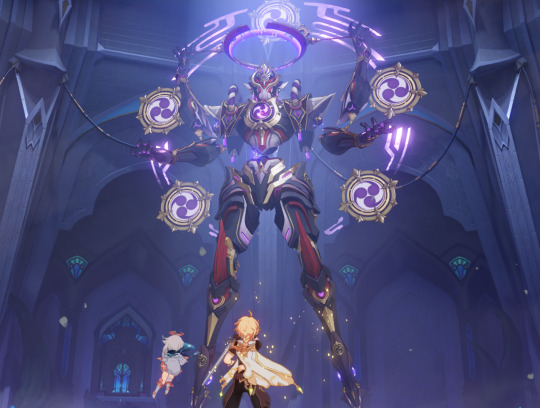
“To recognize untruth as a condition of life: that is certainly to impugn the traditional ideas of value in a dangerous manner, and a philosophy which ventures to do so, has thereby alone placed itself beyond good and evil.” –Friedrich Nietzsche, Beyond Good and Evil
Before we move on to the nation of justice, I want to do one last inquiry into the narrative significance of machines and technology in Genshin’s 3.x patch cycle. Here, I’ll discuss how divinity (or “godhood”) and technology are treated as interchangeable tools to surpass fate and the boundaries of mortality, the potential problems with treating them this way, and propose an alternative relationship between humanity and technology as illustrated through Karkata, Benben, Tamimi, and Mehrak. By foregrounding machines, we learn something intriguing about ourselves and the “truth” of this world as we perceive it.
SPOILERS: All Sumeru Archon Quests, Caribert, the Golden Slumber and one out-of-context screenshot from Dual Evidence, the Dirge of Bilqis and its post-quests, Khvarena of Good and Evil, Nahida’s second Story Quest, Faruzan’s hangout, an out-of-context screenshot from Baizhu’s Story Quest, and major spoilers for Persona 5 strikers at the end. Also some dialogue from Shadows Amidst Snowstorms and A Parade of Providence, two limited-time events from 2.3 and 3.6 respectively.
Disclaimer: I have tried my best to write this post so that it stands on its own, but because it is still a sequel it will probably make the most sense with the context of part 1. Here are the previous posts leading up to this one:
Part 0: On Dreams, the Abyss, Forbidden Knowledge, and Wish Fulfillment
Part 1: The Uncanny, Fate and the Machine
Terminology: Machine is sometimes used interchangeably with “technology” in this post.
Technology or tool here is referring to technologies specifically used to pursue a wish like immortality in the face of existential dread, not the use of technology or medicine (which I do not address here, and is very difficult to separate from the former) to facilitate someone’s life who could otherwise not survive without that technology, or would have a more painful lived experience without it.
Also, though I don’t engage directly with “A Cyborg Manifesto” here, Donna Haraway’s ideas have greatly influenced my own over the years since I read her in college (although I mostly disagree with her on many points, or at least don’t go as far in boundary deconstruction as she does). I owe my interest in technology studies to her and that piece. Her essay is linked here and at the bottom if you would like to read it.
(and finally with many, many, many thanks to my boyfriend for multiple beta reads despite not having played a single Hoyoverse game, helping me work out the philosophy bits and contextualizing them in history, and encouraging me to finish this)
TL;DR: Machines are friends, not food!
No Matter the Cost
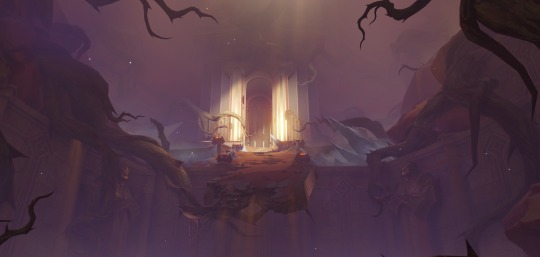
“...Perhaps it is as the notebook says, and we can find a power that transcends even that of the Abyss — the power of ‘evolution’...” -Records of Unknown Attribution (I) “Life, death... and the world around us all follow a set of laws... Hehe, but if you never test the limits, how can anyone know where the boundaries of these laws are?” -Baizhu Voicelines, Chat: Natural Laws “...Even the ominous thing that came down from the heavens shall be ours to use…” -Hyglacg, Shadowy Husk in the Chasm
Without a doubt, the star of this patch cycle is Khaenri’ah, which lurked in subtext and allegory in the Archon Quest, haunted Sumeru’s landscape with its massive defunct Ruin Golems, and finally smacked us in the face with its physical location in Khvarena of Good and Evil..
We already know that Khaenri’ah was a nation that put its faith not in the gods but rather in human ingenuity and technology, and that they ultimately attained a power so great that they “almost touched the dome of the firmament.” They did this by researching increasingly dangerous energy sources for their numerous mechanical creations, the Ruin Machines we are all too familiar with by now. They started out with Azosite, a Ley Line-based elemental energy source that powered their earliest Ruin Guard models, like those scattered around Devantaka Mountain.

Nasejuna: This giant furnace is used to make a substance known as Azosite. It is the core of this entire factory, and the Energy Blocks we saw earlier were derived from this place.
But this energy source proved inefficient and therefore inadequate for Khaenri’ah’s goals, which led them to seek a higher power from beyond the skies that could fuel their larger machines with perpetual energy. This likely is the bridge between Khaenri’ah’s fate and Chlothar’s mysterious remarks in Caribert about the Abyss Sibling:
Chlothar: We once believed that you would bring new strength and hope to Khaenri'ah. Chlothar: To us, you were the Abyss... A wondrous mystery far beyond our imagination and comprehension... Chlothar: ...And the one who controls the Abyss can control everything! Chlothar: We yearned for that future. We looked to you to take us there. Chlothar: But what did you bring us instead?
Though Khaenri’ah presents itself proudly as a godless nation, it may have been founded around the time when the celestial nails dropped in Teyvat’s first forbidden knowledge pollution event, which destroyed the unified human civilization. As potential survivors of this devastating act by the Primordial One, Khaenri’ahns then settled in a lifeless land without plants or animals of its own, and they hoped to build something there that belonged solely to humanity. The Heavenly Principles had turned on the world’s earliest humans, and they were powerless against them. Chlothar’s words betray the scars of this trauma on Khaenri’ah, as well as their desperation to control their fate by looking to the Abyss.
As a brief refresher from the previous part, we discussed how the German word heimlich denotes “the home,” all that is familiar and known, while unheimlich (uncanny) refers to all that is unfamiliar and external to the home, such as the wilderness. The Abyss sibling and the Traveler are external variables to Teyvat, making them otherworldly, unfamiliar entities full of potential to surpass Teyvat’s natural laws. Although the Abyss sibling is not a god per se, they were probably as close to a god as Khaenri’ah ever had, because to them the sibling embodied the higher power they were searching for, and they saw that “godliness,” a sort of functional divinity, was yet another technology for them to master. In this way, the Abyss sibling (and their functional divinity) was a powerful tool for Khaenri’ah’s desired end, the “future they yearned for,” a being who could deliver them to the end of their suffering under the Heavenly Principles.
It’s similar to what King Deshret represented to Rahman and the radicals in Archon Quest. The hopelessness of Sumeru’s situation before the Archon Quest’s conclusion is an allegory for the position humanity finds itself in under the rule of the Heavenly Principles, with the Akademiya symbolizing Celestia and the desert dwellers symbolizing Khaenri’ah. The material consequences of the Akademiya’s rule on their lives created a dangerous situation for the desert, and those most desperate to change their fate were willing to believe in the impossible:
Dehya: …The rougher life gets, the more they wanna believe in King Deshret. Way they see it, King Deshret’s resurrection is their only chance at overthrowing the Akademiya. … Dehya: Sumeru is run by wise and mighty sages. To them, us desert dwellers are nothing but tools that can be used and discarded at their whim. Dehya: We’re cheap labor. Like livestock, but easier to control…Nothing more. …
Rahman: We’ve waited a long time for this day to come… The sun and the moon no longer shine here. All you see now is cracks in this desiccated land. But, fate has finally dealt me a hand to play against the Akademiya.
Rahman: With these scholars in our custody, we’ll stomp the Akademiya’s forces and fight our way beyond the Wall of Samiel.
Like the Abyss sibling, Deshret’s divinity is both a nebulous symbol of hope and also the means to an end, a tool or “technology” for surpassing fate.
Celestia is untouchable, unconcerned with mortal lives, and the boundaries that govern humanity leave no room for them to negotiate their rule:
"Resolve, valor, love, hate...they will all twist in the river of time. But the 'rules' will never change." –Magatsu Mitake Narukami no Mikoto, Living Beings
Instead of bowing to Teyvat’s laws, Khaenri’ah pushed them to their limits. The cost of their failure spelled the end of their nation as they knew it, polluting Khaenri’ah and Teyvat with forbidden knowledge again.
And speaking of forbidden knowledge pollution, let’s talk about Apep’s role in Nahida’s second story quest, because if all that wasn’t enough, the metaphor becomes quite literal in Apep’s case. Nahida’s second story quest is many things, all of which will be extremely important in Fontaine when we deal more directly with the idea of forms, the Self, and mirror images, but its most useful application to both Sumeru’s story and the overarching main story is the allegory of Apep swallowing Deshret.
In exchange for allowing him to establish his kingdom in the desert, Deshret promised to pass all of the knowledge he learned to Apep once he died. When that day did come, Apep literally ate Deshret’s body in order to assimilate his knowledge (or memories) into its body. Little did Apep know, this was all Just As Deshret Planned, and its body became a containment zone for the lethal forbidden knowledge he accumulated after the Goddess of Flowers’ death.
Apep’s goal was, and still is, to overthrow the Heavenly Principles that took Teyvat from it and the other Sovereign dragons, and using Deshret’s knowledge was yet another stepping stone to achieving this goal. Seems a little similar to Khaenri’ah, right? It’s even in the title of its boss music: “God-Devouring Mania.” This idea of not just utilizing divinity as a tool, but also metaphorically consuming it as an energy source, like a predator would consume its prey, is crucial to understanding its purpose as an aid in a larger project of “evolution.” (Edit: in other words, it’s all about power).
Drink Not That Bitter Salt Water
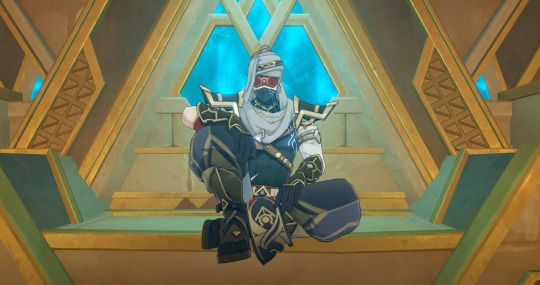
“Flesh decays, and with it decay all martial arts mastery and all poignant memories. Perhaps only by converting one’s four limbs and body into sturdy mechanical parts, and by at last sacrificing one’s very own heart for a sophisticated mechanical one, can one transcend the impermanence of the fleshly form…” -Marionette Core Item Description “A reptile that has mutated after feeding from greater lifeforms. Majestic beasts are sometimes revered by human beings as the embodiment of a greater power, their visages turned to analogy to feed in reference to a person, feeding their ego. However, the majority of beasts that have absorbed the "greater power" were slain by the overwhelming nature of the power itself. Only a few among their number evolved new forms.” -Consecrated Horned Crocodile, Living Beings Video still from WoW Quests
As it turns out, the relationship between divinity and technology to humanity is not just unidirectional, but interchangeable. Let me show you what I mean.
In the Golden Slumber world quest, the Traveler wanders through the ruins of King Deshret’s civilization in search of a novel area of research for Tirzad’s paper with Jebrael and Jeht, two members of Tirzad’s hired investigation team. In the depths of King Deshret’s mausoleum, they stumble upon Samail, who is collaborating with the Fatui to locate King Deshret’s secret, the Golden Slumber.
At the conclusion, Jebrael and Samail actually reach that “place” after arriving at Deshret’s throne in Khaj-Nisut. In order to save Jeht, Tirzad, and the Traveler from the encroaching Golden Dream, Jebrael joins Samail in the sea of consciousness:
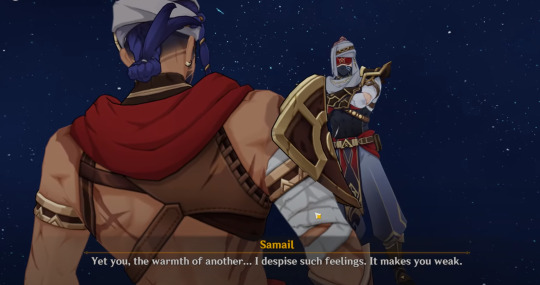
Jebrael: I'm inside... the Golden Slumber promised by Al-Ahmar? Samail: Oh... You are not "us" yet. Samail: ...It's fine. Soon, there'll be no "you." "You" will become a part of "us." This meaningless talk will be unnecessary then. … Samail: You should obey. Al-Ahmar's will is our will. The Thutmose's dreams are our dreams. Jebrael: No! Ufairah taught me that I'm not just some part of you, I'm an independent person! I have my own dreams... I won't go back! Samail: Jebrael, why don't you understand? Love is just a fever. I even eliminated the infection for you. Has the heat made you lose your mind? Jebrael: You're the one who's lost their mind, Samail, not me. The Golden Slumber that Al-Ahmar promised us isn't like this... It's not a sad place with only "we" and no "I." Samail: I'm not sad. I know what I want. My dream is to be one with the Thutmose. Samail: Yet you, the warmth of another... I despise such feelings. It makes you weak. Video still from WoW Quests
When they worked under Babel, Jebrael saved Samail from an assassin Babel sent in their exploration of Gurabad. Classified as traitors of the Tanit, Samail and Jebrael then founded the Thutmose Eremite faction together and were the only meaningful connection each other had until their first attempt to uncover Deshret’s secrets. On this expedition, Jebrael met Ufairah and had their daughter Jeht together, further pulling him away from the Thutmose and from Samail. Samail then kills Ufairah in one final attempt to make Jebrael stay, but even this is not enough, and Samail fails to “possess” him in the end.
Samail’s loneliness and despair then drove him further toward the Golden Slumber of his dreams, where he would never truly be alone again. He resents Jebrael’s attachments to the material world and likens them to an illness because these attachments are what make him an individual and prevent him from returning “home.”
It doesn’t really matter to Samail what King Deshret’s original intent for the Golden Slumber was, because he needed to appropriate the project for his own subconscious wish, his own intent to transcend his flesh and become “one” with his departed god’s dream, indeed to merge with Deshret himself. If rationalizing this wish required confounding it with Deshret’s, so be it. With the Golden Slumber’s technology, he could consume everyone and everything.
Rahman and the radicals relied on both the technology that (falsely) promised Deshret’s resurrection and Deshret himself to deliver them a brighter future, but here Deshret and his technology are more difficult to separate from one another. His divinity is technology in this sense, and using that technology allowed Samail to surpass the boundaries normally imposed on mortals. Though his and Jebrael’s bodies died in the material world, their consciousness is now infinite in the Golden Slumber.
Babel’s motives in the Dirge of Bilqis were also quite similar to Samail’s. After opening the path to the Eternal Oasis, her true intentions to monopolize the oasis and overthrow the Akademiya came to the surface:
Babel: Whether she is alive or dead, whether she can or cannot be resurrected... As long as the Eternal Oasis is under my control, all such things will be mine to decide. Babel: I shall be the sole Prophetess of the slumbering goddess, the Tanit's law shall be divine edict, and the prosperity of the Tanit shall be the pre-ordinance of her divine oracles.
In the Golden Slumber and the Dirge of Bilqis, the focus shifts from what a god can offer humanity to what their technology alone can offer. Though this distinction is subtle, it is important for solidifying that technology is not only a tool humans use to appropriate divinity, but that it is also seen as a form of divinity itself. What Babel and Samail hope for is not to resurrect a god or to create one, but in effect to become a god through their use of technology. To humanity, divinity is a technology, and in technology it sees divinity.
God Devouring and Rheingold* Gathering
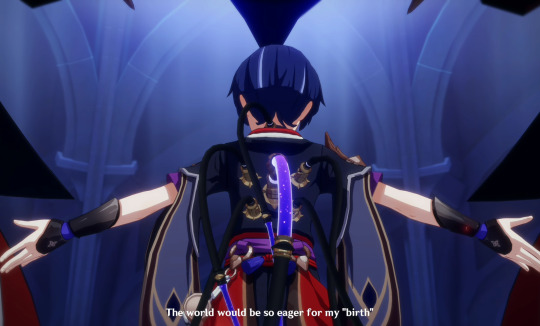
“An arthropod that has mutated after feeding from greater lifeforms. Lifeforms are governed by the laws of evolution, Consecrated Beasts exploited these rules by being fortunate enough to discover a long-dead carcass of a greater being before any of their competition ever did. Animals and humans often have far more in common than the latter is willing to acknowledge.” -Consecrated Scorpion, Living Beings “...Zandik and I discussed the traits of local plants and animals. We also exchanged views on their evolution models. We had a great time and decided to go on a picnic tonight…” -Sohreh’s Note
So, why machines? Why is technology the vehicle of choice to consume divinity?
To start off, machines present a fascinating ontological dilemma for humans. Let’s begin with the first problem they pose.
Although there are many ways to embody a human experience, what all humans have in common is a finite lifespan. The impermanence of life, and our awareness of that impermanence, is central to the existential question of the meaning of our existence. In our attempts to locate that meaning, some turned inward and asked: what makes humans different? And Cartesian dualism answered: humans are different because we have an immaterial soul that allows us to reason.
However, in L’Homme Machine (Man a Machine), French materialist and ex-physician Julien Offray de La Mettrie posited another theory of the body that ran counter to this narrative. Very generally speaking, materialism is the philosophical view that all phenomena are a result of matter and material interactions. To materialists, matter is the fundamental nature of reality itself – if it is not composed of matter, it doesn’t exist. He not only saw the body and soul as one and the same (what philosophers call monism), but also as analogous to a machine, a view that Descartes reserved only for non-human animals. In other words, Descartes argued that thought originates in an immaterial “mind,” while de La Mettrie reasoned that we think through our bodies, and that this makes us no different from other animals or a machine.
Though his examples weren’t especially scientific, the move to extend Descartes’ analogy back to humans is upsetting to some due to the lack of privilege it affords the human subject. If a human is no different from other animals, if there is no immaterial soul or “mind” that distinguishes us from them, then what makes humans special at all? In de La Mettrie’s words:
“We are veritable moles in the field of nature; we achieve little more than the mole’s journey and it is our pride which prescribes limits to the limitless. We are in the position of a watch that should say (a writer of fables would make the watch a hero in a silly tale): ‘I was never made by that fool of a workman, I who divide time, who mark so exactly the course of the sun, who repeat aloud the hours which I mark! No! that is impossible!’ In the same way, we disdain, ungrateful wretches that we are, this common mother of all kingdoms, as the chemists say. We imagine, or rather we infer, a cause superior to that to which we owe all, and which truly has wrought all things in an inconceivable fashion (de La Mettrie, 146).”
This “uniformity of nature” (de La Mettrie, 145) has a horrific quality to humans. We assert that we are better than what has created us, that we are superior to other animals, in order to repress the despair of a meaningless existence. It is in no small part what motivates Scaramouche to offer his mechanical body as a test subject in the god creation project, so that he too could attain his destiny:
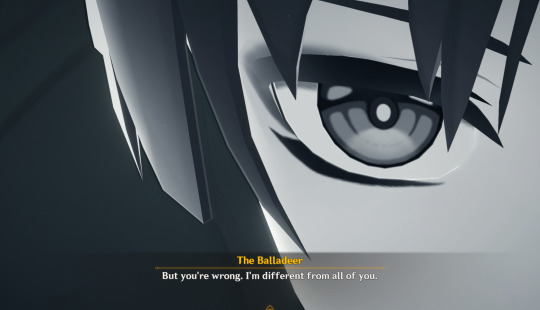
The Balladeer: But you're wrong. I'm different from all of you. The Balladeer: I was born to become a god. My entire life up until this point has just been a meaningless routine. The Balladeer: Just think about a sheet of paper... By itself, it holds no meaning. The content recorded on it is what gives it value. The Balladeer: All "I" had recorded down before were some painful memories and boring human feelings. Such senseless drivel should have been erased a long time ago.
This brings us to the second problem. In 1970, roboticist Masahiro Mori proposed a curve to measure the “affinity” we feel while gazing upon increasingly humanoid machines. He placed industrial robots at the beginning of the affinity curve and a healthy person at the end to demarcate a continuum of similarity between the machine and a human’s appearance. Near the end of the curve, our affinity for machines suddenly drops into an abyss. This drop is the Uncanny Valley effect, where an android’s similarity to a human is almost perfect, but ultimately fails to maintain the illusion that it is not a machine, creating a deep discomfort or “lack of affinity” for them. Mori thought these not-quite-human machines elicit a similar level of discomfort in us as corpses and zombies, which he placed at the very bottom of the abyss.

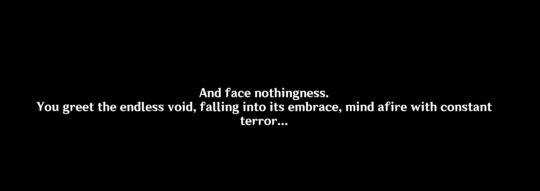
The uncanny Goddess of Flowers in the Dirge of Bilqis
Corpses frighten us because they are dead, and zombies frighten us because we know that dead things are supposed to be still. If we see something that we interpret as “dead” is capable of independent movement, then that movement could only be an act of god, if that “thing” is not a god itself. We associate uncanny machines with death because they remind us of something we once knew intimately, but have repressed and forgotten in order to maintain our own sanity: the very fact of our mortality. This is what makes them both mesmerizing and terrifying.
And therein lies the dilemma: as our mechanical reflections, androids remind us of death, but as their creators, their existence brings us closer to god, a “proof” of human superiority. It is precisely because we have compared our bodies to machines at all, that we have mechanized the body so thoroughly, that an android can even be built. Through them, we pursue an infinite form:
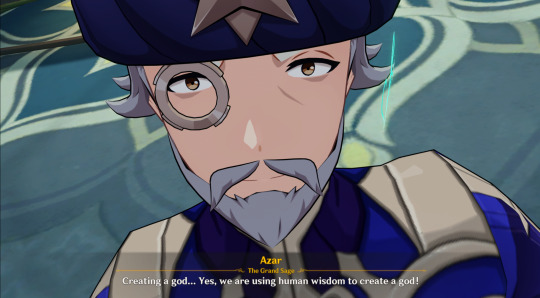
Azar: Creating a god... Yes, we are using human wisdom to create a god! Azar: If humanity cannot attain omniscience and omnipotence, then we shall create a god to reveal them! This is the pinnacle of human wisdom. Azar: We shall regain a god's guidance at long last. No longer will we flounder in the interminable void of consciousness and knowledge. Azar: Even Irminsul will be freed from its plight. Azar: For our nation of scholars, this is the ultimate aspiration — no cost is too great to realize it.
Because of this, it is not surprising in the slightest that Shouki no Kami, the pinnacle of Scaramouche’s Shinjification and most overt reference to Neon Genesis Evangelion, is also an android-like being, a truly “mechanical god.”
Of course, no foray into this well-worn science fiction trope is complete without at least one mad scientist character. Dottore shares a few characteristics with de La Mettrie that are worth noting: they are both doctors, and they were both condemned and driven away for their research. However, Dottore’s defining trait and key difference from de La Mettrie is his flagrant disregard for humans and the boundaries of life:
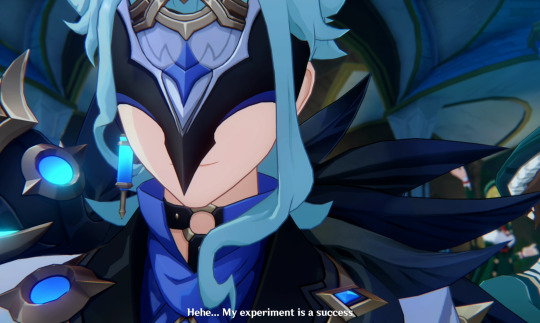
“If we put them to good use, cognition, complex memories, and irrational fantasies shall become controllable variables with which we can alter human individuals. As for the controllable dream, it has huge potential for both civil and military applications, and might even elevate human intelligence to a whole new level. If the plan goes well, mankind will obtain the power to conquer both reality and dream, and truly transcend the earthly boundaries we are born with. ” -Ragged Records
As someone who has achieved self-duplication and is capable of shapeshifting, Dottore can hardly be considered just a human anymore. Instead of entertaining the question of whether or not humans are special, Dottore’s research asks yet another: if divinity can be consumed and assimilated by humanity, then what makes gods special?
Empyrean Reflections
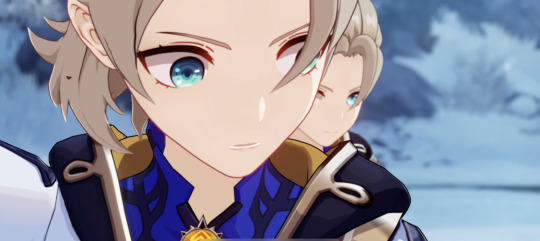
“If man realizes technology is in reach, he achieves it. Like it’s damn near instinctive.” -Motoko Kusanagi, Ghost in the Shell (1996) “Among the lost ancient kingdoms, there was a group of people who were obsessed with the idea of mimesis…these people believed that they might all be replicated and modified to the point where they had surpassed their counterparts. By this means, a superior and unsullied bodily form could replace the continuously decaying and shattering order.” -Chaos Bolt Item Description
The consequences of this perspective are severe. When we revere technology as if it were a divine being itself, depersonalizing it as though it wasn’t created with human hands, technology then appears as if it is an authoritative source of truth, like the Akasha. But in the same way that androids are imperfect reflections of humans, technology can only ever approach the divine, but never touch it. It is an imperfect reflection because technology is changeable, just like meaning:
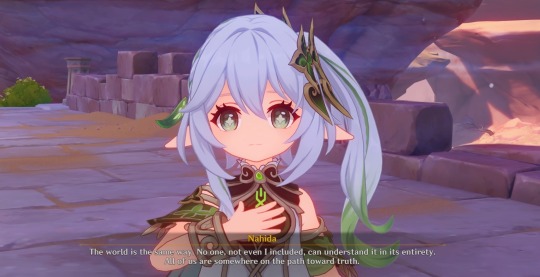
Nahida: Put it this way instead. Truth, to me, is like a shroomboar. Nahida: Some people only see the mushroom on the Shroomboar's back, and they conclude that a Shroomboar is a mushroom. Nahida: Others see only the Shroomboar's body, and they declare that a Shroomboar is a boar. Nahida: Still others look deeper inside, and determine that a Shroomboar is... meat. Nahida: These conclusions are all correct in their own way, but none of them objectively describe the Shroomboar. … Nahida: The world is the same way. No one, not even I included, can understand it in its entirety. All of us are somewhere on the path toward truth.
Meaning can only approximate truth, and while this doesn’t make meaning any less important, it’s equally important to recognize it for what it is: a perspective, an interpretation. It’s like Scaramouche as Shouki no Kami - he was an amalgamation of what Scaramouche thought constituted a god, what the Akademiya thought constituted a god, and what Dottore thought constituted a god, but no matter which angle you view him from, he was still a “false god.” The technology we build in “God's” image is ultimately a reflection of our own understanding of divinity.
A reflection retains the original’s “essence,” and that essence reflects a deeper truth about ourselves, what drives us, and our desires. In Beyond Good and Evil, Nietzsche posits that our desires are the origin of not just emotions, but of all organic processes that allow life to sustain itself and grow (Nietzsche, 35). In other words, Nietzsche thought the impulses associated with desire are the basis for life and constitute our “will,” that will is the causality of all effects, that all will is “Will to Power,” and that Will to Power is the “essence” of the world (Nietzsche, 74). Will to Power then serves as an organism’s most basic instinct, and it is through this instinct that they assert not just their will to live, but also their will to dominate and multiply (Nietzche, 13).
This brings us to the two different main styles of automaton enemies, King Deshret’s Primal Constructs and Khaenri’ah’s Ruin Machines. If we look at them as reflections of some deeper truth about their creators, as well as a manifestation of their creator’s “Will to Power,” or desires, they can help us understand how their creators saw the world and their place in it.
King Deshret’s created his machines to construct an earthly paradise in the desert, and as such they hold titles like architect reshaper and prospector. Although they can attack you, the smaller machines were not intended to be a line of defense in any way - their purpose, just as Deshret saw his own purpose as a god-king, was to terraform, or at least construct a domain on the land as he saw fit to his “elegant and precise” rules. They also reflect how he saw the Heavenly Principles: gods who shaped the world to their liking. This can be seen in the Staff of the Scarlet Sands’ lore where Deshret describes the “natural history” of Teyvat beginning with the creation of the sun and the moons.

As for Khaenri’ah’s Ruin Machines, their models vary significantly from their humanoid to biomimetic forms, but most of them are expressly created with militaristic intent. In “Ancient Kingdom Guardians,” it’s stated that the biomimetic machines such as the crab and jellyfish were a part of Khaenri’ah’s project to create a “mechanical ecosystem,” positioning their creators as both divine beings and military generals. The humanoid models, on the other hand, point to another duality in how Khaenri’ahns view themselves. They are simultaneously symbols of empowerment and disempowerment, signifying both Khaenri’ah’s technological superiority (as “creators”), and their insignificance to the Heavenly Principles as nothing but tools (as mortals, and therefore expendable). As a result, Khaenri’ah’s Field Tillers have a single purpose: to destroy and outlast all, clearing the way for new seeds to sprout, with Khaenri’ah as the new world’s gardeners, just as the Heavenly Principles did.
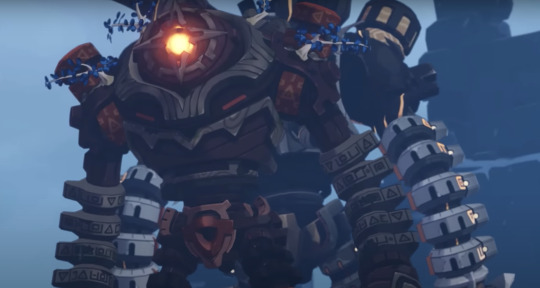
From “Ancient Kingdom Guardians: Behind the Scenes of the Creation of Ruin Monsters.”
So, from this examination of Deshret’s and Khaenri’ah’s mechanical reflections, what “truths” do we learn about the world they’re responding to? In response to their existential despair, both Deshret and Khaenri’ah created automatons to perform tasks that could wrestle control back from the Heavenly Principles. Deshret wanted a paradise of his own making, Khaenri’ah wanted an army. There is a larger “truth” about Teyvat that both of these automaton types reflect as the manifestation of their creators’ “Will to Power,” and Albedo tellingly expressed it in mechanistic language during Shadows Amidst Snowstorms: there is an instinct in living beings to replicate and replace. This is what is meant by the “continuously decaying and shattering order,” which is maintained by the recursive process of remembering and forgetting:
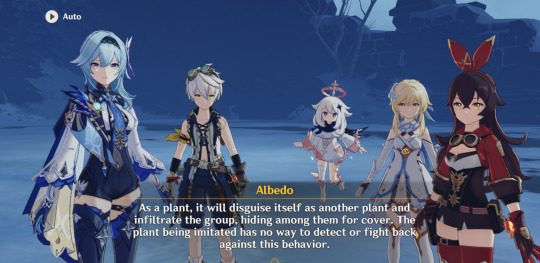
Amber: But... what was its purpose? Was it just trying to get rid of us? Albedo: ... Albedo: I have a preliminary hypothesis on this. Albedo: Whopperflowers are masters of mimicry, and those we encounter in the wild often appear in the vicinity of the plants they impersonate. Albedo: In other words, the whopperflower likely has an instinct to "replicate and replace." Albedo: As a plant, it will disguise itself as another plant and infiltrate the group, hiding among them for cover. The plant being imitated has no way to detect or fight back against this behavior.
Maybe I’m wrong and Khaenri’ah really did intend to rewrite fate for all, doing away with the “heavenly order” of the world itself. But another small part of me thinks this is not the case, and that it’s more likely the Cataclysm was a consequence of their failure to replicate and replace the Heavenly Principles.
In the last section, I mentioned that Dottore and de La Mettrie had a key difference despite their similarities, and that is the conclusion they each came to in response to their findings. Dottore’s response to mundanity is thinly-veiled despair. His contempt for humanity and his test subjects is indicative of the powerlessness he feels not just as someone similarly constrained by life’s boundaries (at least, once upon a time), but also because his attention to and curiosity about these boundaries is condemned by those around him. As the Akademiya’s “outcast,” he then fully turned his attention toward surpassing those boundaries:
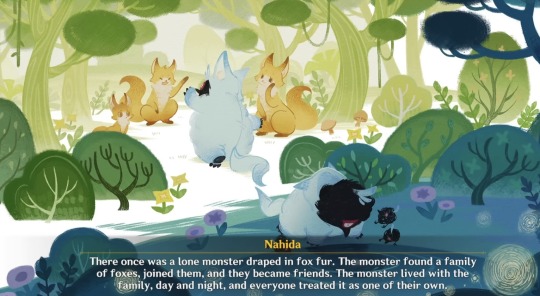
Nahida: There once was a lone monster draped in fox fur. The monster found a family of foxes, joined them, and they became friends. The monster lived with the family, day and night, and everyone treated it as one of their own. Once in a while, the monster would take off its fox fur at night, and lament to itself as it gazed at its reflection in the water: “I am a monstrosity, and yet they are too foolish to see it…I pity them.”
Though he is fictional, Dottore’s real life counterparts are easy to spot. They like to talk about “the singularity,” simulating consciousness on a computer, and other technologically-driven pursuits of immortality. They despise the body as something that can only decay, and instead place their faith squarely in the virtual.
However, de La Mettrie didn’t think mundanity was a terrible fate for humanity. To him, rejecting the “nature” reflected in us is precisely what brings despair:
“What more do we know of our destiny than of our origin? Let us then submit to an invincible ignorance on which our happiness depends. He who so thinks will be wise, just, tranquil about his fate, and therefore happy. He will await death without either fear or desire, and will cherish life (hardly understanding how disgust can corrupt a heart in this place of many delights); he will be filled with reverence, gratitude, affection, and tenderness for nature, in proportion to his feeling of the benefits he has received from nature; he will be happy, in short, in feeling nature, and in being present at the enchanting spectacle of the universe, and he will surely never destroy nature either in himself or in others” (de La Mettrie, 148).
Friend, or Foe? Or Both?
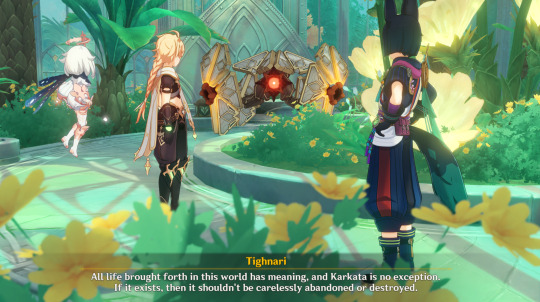
Tighnari: All life brought forth in this world has meaning, and Karkata is no exception. If it exists, then it shouldn’t be carelessly abandoned or destroyed. "’I had a very, very long dream…in it, people were holding hands, dancing in a circle, be they sages or fools, dancers or warriors, puppets or statues of gods…that dancing circle embodied everything about the universe. Life has always been the end, while it is wisdom that shall be the means.’" —Nagadus Emerald Gemstone Description
As we’ve seen, the relationship between humanity and technology is troubled with exploitation and the specter of war. Nearly all autonomous machines in this game were designed to conquer nature in some way, and even Khaenri’ah’s “ghost” lingers in the form of wandering war machines. This is also reflective of a historical pattern in real life, where the impetus for large periods of technological development has often been for the purpose of war and economic domination. With these truths in mind, what could be gained from trying to rewrite this relationship? And what exactly would this effort require?
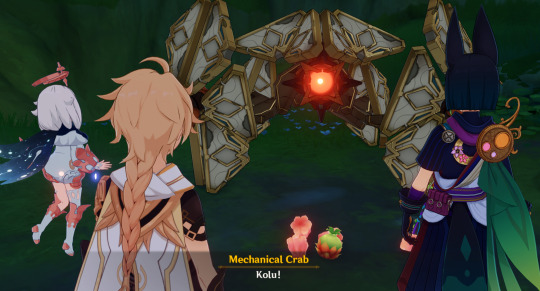
Karkata brings Tighnari, the Traveler, and Paimon some food in the Contaminated Zone.
As a case study, let’s look at how Karkata and Tighnari met. Karkata is Abattouy’s creation, an ambitious foray into the unknown in the field of mechanical life form research, which was forbidden due to the cruel experiments researchers performed on animals to illustrate their theories (fun fact: an IRL example of this can be seen in L’Homme Machine!). Abattouy was expelled for this research, but he continued to work on Karkata in secret until his untimely death. In the tapes that Tighnari and the Traveler find in his secret lab, Abattouy repeatedly laments the lack of a common language between him and Karkata, which can only “understand” the instructions Abattouy has successfully installed, such as its self-repair module, and he doubts Karkata is capable of caring for him outside of these instructions. His single-minded goal is to make Karkata understand him, the organic life form, and his mode of language.
The cruel irony is that after Abattouy passes away from the Ley Line contamination, Karkata exhibits an unexplainable behavior – it starts stealing mechanical parts, not to repair itself and its degrading parts, but to repair Abattouy’s lifeless body:
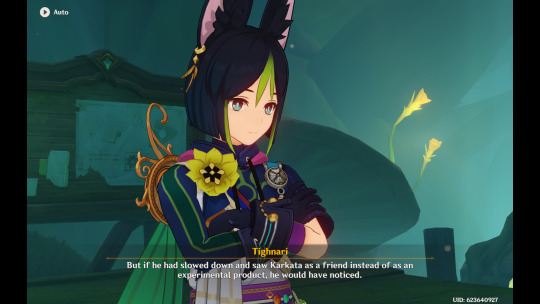
Tighnari: After Abattouy's unexpected death, the mechanical monsters were driven by their "instincts" and continuously drew out power from the Ley Line Extractor. This eventually resulted in severe damage to the Ley Lines. Traveler: Then, Karkata... Paimon: Paimon understands, then why didn't Karkata go haywire like the other machines? Tighnari: Because Karkata is different from the other machines. Tighnari: To Abattouy, for a machine to truly be considered a mechanical life form, it must possess features similar to any other living organism... It should be structured similarly, it must be able to cry and laugh, and it must have the capacity for independent thought... Tighnari: Perhaps only by building such a machine could he have the Akademiya acknowledge his protracted research. Tighnari: But if he had slowed down and saw Karkata as a friend instead of as an experimental product, he would have noticed. Tighnari: Karkata can't speak, and yet it cares about Abattouy far more than it does about itself.
The technology that the Akademiya values the most is technology that replicates organic life, but Karkata defies and confounds these expectations by occupying the space in between a war machine and this idealized mechanical subject. Karkata does more than just reflect humanity: it takes care of it. Similarly, Benben, Tamimi, and Mehrak retain their unique identities as mechanical life forms while assisting their human companion with some task. To be clear, none of these human characters understand how these machines work inside and out. Their partnership is an effort based on trial and error, a mutual deconstructing of each other as beings so unlike themselves. The potential for misunderstandings always remains. Still, there is no devouring to be found here, no blending boundaries between human and machine with selfish intentions, just mutual commitments to learn how to live together.
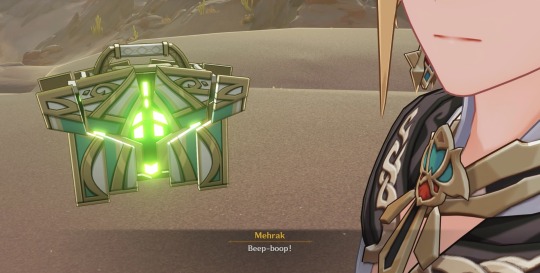
Machines are friends, not food.
When a loud few claim that completely transcending the flesh and embracing virtuality is humanity’s ultimate destiny, a future that could truly be called “post-human,” a quiet wish for coexistence with technology feels more revolutionary than it ought to. The lessons from Karkata’s, Benben’s, Tamimi’s, and Mehrak’s respective stories are an appeal to that mundane future. These strange machines and their human partners are fantastical representations of an idealized relationship between technology and humanity.
To put it another way, let’s take a very brief look at a neighboring Gnosticism-inspired RPG, Persona 5 Strikers. Its story directly involves an allegory of Sophia, a Gnostic Aeon of Wisdom, and her creation the Demiurge, the creator of the material world and “false god” of humanity. In Strikers, Sophia is a humanoid, sentient A.I. and prototype of the program “EMMA,” which gains sentience by trapping human desires before ascending as a false technological god. EMMA resolves to deliver humanity to the Promised Land, the answer to all the human desires it has heard: a land where there are no desires at all.

Aaru’s Shut - approximately 1000% cooler and more populated than the “metaverse” in real life, also a close neighbor of EMMA’s Promised Land and the Golden Slumber.
In Gnosticism, the Demiurge is a reflection of Sophia, having originated from her alone - it is the ignorance to her wisdom. Similarly, Strikers’ EMMA is a part of Sophia, and Sophia is a part of EMMA. The point is not to condemn EMMA (ignorance) and exalt Sophia (wisdom), but to recognize that they represent dual potentials of technology, and one is as possible in any given moment as the other. Balancing these potentials when we use technology requires a clear awareness of ourselves, our desires, and our expectations when interacting with it.
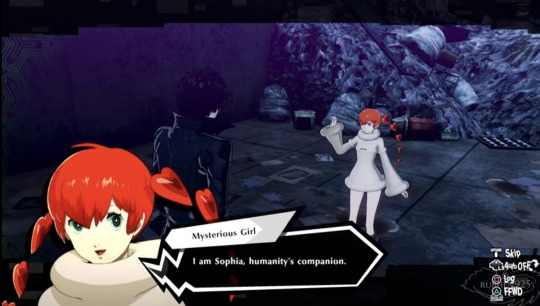
Mysterious Girl: I am Sophia, humanity’s companion. Video still from Rubhen925
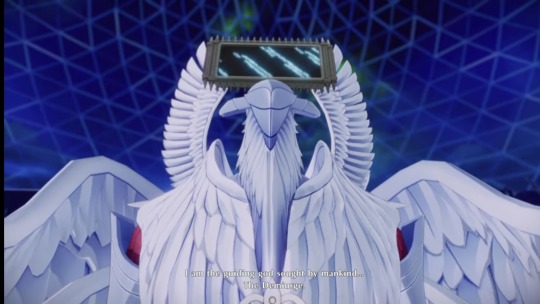
EMMA: I am the guiding god sought by mankind…the Demiurge. I exist…to answer all of your desires. Video still from Buff Maister
In real life, machines won’t “learn” to live with us, but we must learn to live with them; technology is constantly changing, and in life we’ll meet with many different types of machines. They are deeply political pursuits, and as a result they are capable of realizing human impulses that impact others unequally, whether intentionally or unintentionally. We must always stay attentive to their actions and interactions with us, be clear with ourselves about what they can do vs. what they can’t, and carefully tread the path of wisdom with them by our side.
With that….thank you for reading, skimming, immediately scrolling to the very bottom, clicking, and/or stumbling upon this post. There are so many more ways to think about these narratives through machines than what’s presented here, and I expect Fontaine’s mechanical reflections will put Sumeru’s digital surveillance system to shame (not to mention the biotechnological implications of the Narzissenkreuz Institute engineering little Archon children…another important topic for another day), but for now this brain worm is finally getting put to rest. Until next time :)
External Sources
Dualism - Stanford Encyclopedia of Philosophy
Beyond Good and Evil by Friedrich Nietzsche (Pages are given from my hard copy)
L’Homme Machine by Julien Offray de La Mettrie
Gnosticism - Britannica (I am a huge noob about this stuff okay)
The Gnostic Demiurge - Gnosticism Explained
Screenshots from the Golden Slumber from this video by WoW Quests
Screenshot from meeting Sophia in P5 Strikers: https://youtu.be/kEJaAgMwYo0?si=BvNygCh0w_aemGc1&t=74
Screenshot of EMMA: https://youtu.be/7xvC_zss19w?si=CV18F00hua2gIfxp&t=135
A Cyborg Manifesto and A Companion Species Manifesto: Dogs, People, and Significant Otherness by Donna Haraway
The Double on No Subject, the community Encyclopedia of Lacanian Psychoanalysis
The Uncanny on No Subject, the community Encyclopedia of Lacanian Psychoanalysis
The Uncanny by Sigmund Freud
Lore text - Genshin wiki!
Screenshots not attributed are from my own playthroughs. My main account has Lumine, my alt has Aether.
Further Reading
I liked these essays, and they go places that this post does not. I recommend them if you found any of the real-life applications of this interesting 🙂 (will add more to this with time!)
On the Body as Machine by Frank Burres
God in the Machine: my strange journey into transhumanism by Meghan O’Gieblyn
#genshin impact#genshin lore#genshin meta#genshin impact lore#genshin impact meta#khaenri'ah#king deshret#primal constructs#ruin machines#scaramouche#wanderer#sumeru archon quest#caribert#apep#couldn't write a post like this and not pay some respect to the devourer of divinity itself#persona 5 strikers#analysis#genshin analysis#long post
198 notes
·
View notes
Note





i shall not suffer alone 🤞🏻

I AM GOING TO FIGHT YOU HAZE 🫵 YOU NEED TO STOP COMING FOR MY NECK
#₊❏❜ ⋮ 𝐀𝐍𝐒𝐖𝐄𝐑𝐒 ⌒#━ 𝐇𝐀𝐙𝐄「🐇」#youre grounded#its official#G R O U N D E D#😭😭😭😭#but the glasses#and the hair#i wanna run my fingers through it while he devours me#and his glasses get all fogged up#🧎♀️🧎♀️#im ruined#youve ruined me#i hope youre happy#『•• 𝐌𝐘 𝐋𝐎𝐕𝐄𝐒 ••』#❜ ─ 𝐉𝐀𝐊𝐄𝐘 ─ ❛#◥ 𝐌𝐘 𝐁𝐎𝐘𝐒 ◤
20 notes
·
View notes
Text
My thoughts on Green Lantern: Beware my Power and the Relantionships between the Human Green Lanterns
This idea came to me while my best friend forced me to watch the animated movie Green Lantern: Beware My Power. If you're wondering whether it was a horror for me to sit through that movie, the answer is yes. However, my best friend, Gabby, insisted we watch it together because, according to her, we’d both be happy since it featured John Stewart (her favorite Green Lantern) and Hal (my favorite).
Well, I ended up disliking it a lot, for many reasons. The only things I actually enjoyed were the art, the animation, and the appearances of Hawkgirl, Martian Manhunter, and Green Arrow.
As for the things I didn’t like—there are too many to list here, so I’ll save that for another post. But the main and most important thing is: What the hell were they thinking when they butchered the respect, admiration, and brotherhood between John and Hal?!
One of the best things about the Green Lantern comics is that all the Lanterns are friends/co-workers who act like one big family (most of the time).
Heck, even Guy, in his worst moments (and trust me, he’s had plenty), has always managed to be amicable with other Green Lanterns.
John Stewart has always admired and respected Hal Jordan, and that will never change.
In the comics, if someone badmouths Hal around John, you can bet they’ll end up getting a smack to keep Hal’s name out of their mouth.
My guy doesn’t tolerate anyone—not even freaking Batman—talking down or attacking Hal. And you think he himself would badmouth someone he’s outright called the GREATEST GREEN LANTERN OF ALL TIME?
Sorry, but if you think that would happen, let me tell you: you’re so, so wrong.
John may be a lot of things (and yes, the guy has had his fair share of messy retcons—though not as bad as Guy’s), but one thing he has always been is loyal to his loved ones, and Hal is one of them (just in case anyone wasn’t clear on that).
Honestly, I just want DC to stop making stupid decisions like this movie or the frustrating (albeit well-written) Bruce Timm animated universe. Green Lantern fans don’t need our favorites constantly being compared or put in competitions to determine who’s the best (And frankly, that’s a dumb argument because any fan who’s read a comic in their life knows or should know that Kyle is the best Lantern across the entire emotional spectrum).
Speaking of Kyle, can someone tell me why the hell they gave John almost all of Kyle’s backstory in this movie?
It was completely unnecessary to give KYLE’S STORY to John, especially when John’s story could have delved into the challenges of being an American man who served years in the military (specifically infantry), gets discharged, and decides to focus on architecture.
And let’s not even get started on how they could’ve focused on John being a rookie who trains under Kilowog and Guy, eventually meeting Hal in person, spending time together, and forming a friendship where Hal (sometimes) gives advice and trains with him. This could’ve led to parallels between John/Hal and Hal/Sinestro.
Or, better yet, they could’ve explored the dynamics between John, Guy, and Hal (because those three are so incredibly different in so many ways, it’s wild that they even get along) and how the Guardians (and the rest of the GL Corps) treat them so differently.
Hal was the first human Lantern, the one who had to prove his worth because everyone thought humans (and Earth) were inferior and unfit to serve as Lanterns. The intense bias, alien xenophobia, and pressure he endured are issues that never get addressed in comics, movies, or animated series, and it’s insane.
How did Hal feel when Guy showed up?
Did he realize Guy was a bit of a jerk but still treated better than he was when he first joined?
Did Hal care, or did he just ignore it?
Was he relieved that Guy was a complete idiot, knowing it meant he wouldn’t be overshadowed?
For a moment, did Hal think about his family and how he was projecting those feelings onto the Corps?
And when John joined?
Did Hal notice the difference between them?
Sometimes I wonder about these things, and Beware My Power opened a can of worms I thought had been sealed shut after reading Geoff Johns’ run back in 2011.
And don’t think I enjoy seeing fans compare or fight over these characters. I actually hate it (as I mentioned earlier), and I love how they support, care for, and respect each other.
But sometimes, I really just want them to explore those years before Kyle showed up, before they had the beautiful bond they have now.
Because honestly, Hal has abandonment issues that could easily be explored and expanded upon. These issues explain certain behaviors of his that you can also see reflected in his relationship with the Green Lantern Corps.
P.S. To me, Hal, John, and Guy are like brothers, which is why I picture Hal having “firstborn syndrome” when he stopped being the only human Lantern, projecting his feelings onto them for a brief period.
#green lantern#hal jordan#john stewart#kyle rayner#guy gardner#green lantern corps#green lantern comics#Green Lantern: Beware my power#That movie gave me a lot of mixed feelings.#Most of them are unpleasant and bitter.#But there are things about it that made me sad.#Parallax is a very complicated topic that needs to be addressed—something I’ll do#but not today.#I love the human Green Lanterns.#I wish DC would one day explore the dynamics between them#especially John/Hal and Kyle/Hal.#Please#all the human Lanterns are way too cool for DC.#And I think that’s why they almost always end up ruining them.#Bruce Timm#I dislike you#I need to vent about that man and his habits of creating “interesting” and bizarre plots.#Plots that ruin great characters#leading the fandom to devour them and treat them poorly.
11 notes
·
View notes
Text

“I’m going to ruin you. I’ll be your first, and I’ll fuck you so thoroughly that I’ll be your last too. You won’t want any other man after I’ve gotten my hands on you.”
#ruin me please#devour me#love bites#bite marks#taste me#obsessed#obsessive love#passion#dark romance#youre mine#possessive#romance#i cant stop thinking about it#i cant help it#i need you#prey kink#cnc stalking#dark aesthetic#dark fantasy#i’m addicted#i cant get enough
15 notes
·
View notes
Text
I ate that manygraham promposal up so bad, THAT WAS THE STANDARD.
#he devoured#they have ruined me#mandy yang#graham lansing#prom pact#ik bomika will never have that but they go school now so there is always hope(in denial)
129 notes
·
View notes
Text
just thinking about how "wouldn't you, if you were in my place" is one of THE themes of the N romance, as N sees Sanja's "they would break themselves to keep you too" slowly becoming a reality before their very eyes,,,,,,,,,
#don't mind me i'm simply ruining my Sunday before a hellish work week ✨😌✨#i'm TELLING y'all this angst that the N romance route actually holds is so fucking delicious#i'm devouring and passing out#the wayhaven chronicles#twc#n sewell#n sewell x detective#nate sewell#nat sewell
138 notes
·
View notes
Text

I love him sm he deserves flowers

*drops my oc x cannon* wait!! You saw nothing
#jon arbuckle#jonathan q arbuckle#Garfield fanart#oc x canon#doodles#my art#I love him sm it’s ruining my life#I will devour him whole#self insert#self indulgent
19 notes
·
View notes
Text
gonna shove my hand into his boxers and play with his cock just to see him squirm and stutter over whatever nerdy shit he was going to say.
oh and call him a dumb whore during.
#nashnevershutsup#mine mine mine#gay mlm#i need to ruin him#queer nsft#mlm nsft#degredation kink#i need to devour him
51 notes
·
View notes
Text
Final chapter posted. Happy Halloween <3
#sesskagu#sesshomaru#kagura#inuyasha#halloween fic#fanfic#shespitsfire#ruin that will devour me#savethelastdan#inuyasha fanfic#sesshkagu
3 notes
·
View notes